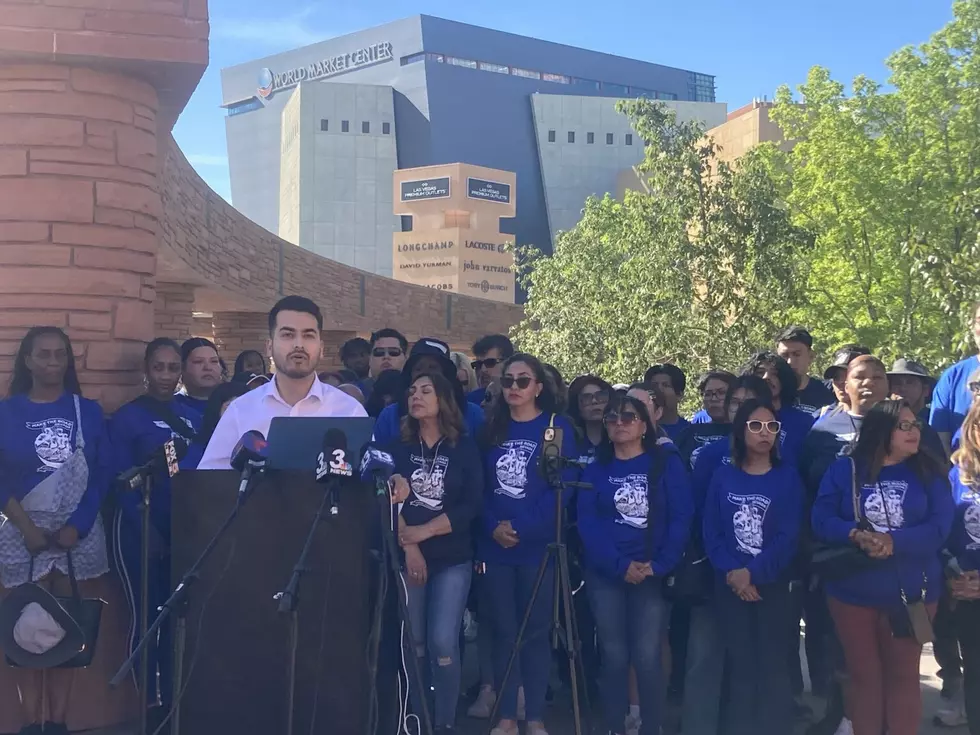
Las Vegas approves strict regulations on sidewalk vendors
(Nevada Current) Street food vendors can now legally operate in Clark County, but the strict regulations on the iconic sellers will likely curb their presence throughout the valley.
During an hours-long Clark County Commissioners meeting Tuesday, commissioners unanimously voted on regulations for street vendors, bringing the county in line with state law.
Last year, Gov. Joe Lombardo signed Senate Bill 92 into law to create a legal pathway for street vendors to legally operate in the state. Before that, sidewalk vendors were essentially prohibited from doing business in the state.
Under the ordinance, sidewalk vendors operating in Clark County will be required to obtain a license and pay an annual fee of $150, hold a permit with the health district, and maintain liability insurance. Applications for a license will cost vendors $45.
Vendors will be banned from operating within 500 feet of certain permitted events, county recreational or community facilities, schools while in session, and parks. Vendors who wish to sell at a county park will need to obtain a pricey “temporary multi-vendor permit.”
Vendors are also banned from setting up shop within 150 feet of a licensed food establishment during business hours. They will also need to stay at least 15 feet away from any intersection, cross walk or bus stop.
According to the ordinance, vendors will only be permitted to operate from 8 a.m. to 9 p.m., likely aimed at late night roadside taco stands known as “puestos.”
Street food vendors will be required to limit all vending equipment to a single 25 square foot stand or cart.
If vendors violate the regulations set in place, they could face a fine of up to $500 for each violation. Law enforcement officers will also be able to destroy or dispose of any food sold by sidewalk vendors without a valid health permit.
Violations outside of a residential zone could result in a six months jail sentence, a $500 fine, or both. The ordinance will go into effect in two weeks.
Clark County Commission Chair Tick Segerblom acknowledged vendors’ disappointment with the sweeping ordinance, but signaled the commission was open to revisiting it.
“This is the biggest thing we’ve done in my five years here,” Segerblom said.
During the county meeting, sidewalk vendors urged the commission to reevaluate the strict regulations, particularly the restrictions around parks and schools, where many vendors operate. Vendors described being victims of theft when working in less populated areas.
Clark County business groups also asked for changes to the ordinance, advocating for more stringent regulations. The Nevada Resort Association, Vegas Chamber and Henderson Chamber of Commerce argued that street vendors should operate under the same code and health requirements as brick-and-mortar businesses.
During a press conference after the vote, state Sen. Fabian Doñate, D-Las Vegas, who was the primary sponsor for Senate Bill 92, called the moment “bittersweet.”
“While on one hand, we finally have a legalized pathway for these vendors to operate… a part of me feels like we did fall short,” Doñate said.
Teodora Tepetzi, a street vendor in Clark County and a member of Make the Road Nevada, said she was disappointed with the ordinance’s restrictions. Tepetzi said she was prepared to go through the permitting process, but believes the ordinance as written will prevent many street vendors from accessing permits.
“They’ve left us behind and ignored our concerns, and our needs as street vendors. How is it possible that a city as prosperous as Las Vegas continues to deny us the ability to work with dignity,” Tepetzi said in her native Spanish. “It’s an insult to our hard work and our contribution to the community.”

Doñate argued the Southern Nevada Health District has failed to effectively modernize rules that often make it too difficult, time-consuming or expensive for sidewalk vendors to obtain valid health permits, calling on the agency to “do their jobs.”
“They admitted on the record that they have slow-walked the process of updating the regulations for many of these vendors to be able to achieve the proper licensing,” Doñate said. “Help these vendors get licensed, actually do the work that you’ve been entrusted to which is to serve the public and protect public health. And that starts by creating a process that treats these vendors where they’re at.”
Doñate said commissioners seemed open to revisiting the ordinance, but added that if their efforts fall short, “we’ll take the fight to the Legislature.”
